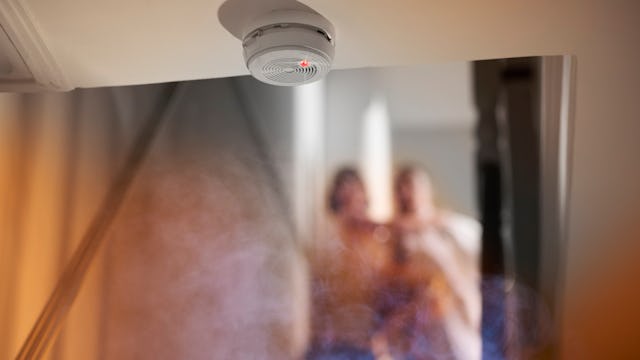Kids Sleep Through Regular Smoke Alarms But Wake Instantly To Their Mom's Voice

A new study discovered a huge difference in waking times when kids were subjected to a regular smoke alarm and their mother’s voice
In a study that produced results we can only describe as stunning, researchers discovered that kids are far more likely to wake quickly to a smoke alarm featuring their mother’s voice than one producing a typical tone alarm. The results could change the types of smoke alarms currently on the market — and has the potential to save lives.
The research, published this week in The Journal of Pediatrics, looked at 176 kids ages 5-12 and found that children in this age range were almost three times more likely to wake to an alarm that used their mother’s voice to rouse them versus a traditional smoke alarm. The difference is honestly astounding with 86-91 percent of children waking to their mom’s voice and prompting 84-86 percent to then escape the room. That’s compared to 53 percent awakened and 51 percent escaped for the tone alarm. The median time for a child to wake up was 156 seconds for the tone alarm and two seconds for each voice alarm (the researchers tried three different voice alarms).
Two seconds. Amazing.
The study reads, “An important risk factor for death during a residential fire is being asleep. The fire fatality rate during sleep is approximately 3 times greater than during other periods.” They also state that around half of residential fire deaths happen at night, with those in the home asleep at the time. The study concludes that kids are “remarkably resistant” to waking to regular smoke alarms with some subjects sleeping through it for up to five minutes.
Study author Gary Smith, director of the Center for Injury Research and Policy at Nationwide Children’s Hospital, tells HuffPost, “Clearly, under residential conditions, we were able to demonstrate that these voice alarms are much more effective than the typical high-pitch alarm.”
This probably isn’t terribly surprising to most seasoned parents. I’ve been amazed over the years at the loud crashing sounds (hello, putting away pots and pans) my kids manage to sleep through, but I utter a single low-pitch sentence to my husband and someone, somehow, bolts awake and needs a glass of water. Science is only confirming what we already know — our kids hear us easily. Whether they actually listen is another story.
“Just having one of the current alarms in your home provides a huge survival advantage, and we absolutely do not want to give the message that the current alarms are not working,” Smith said. “What we’re trying to do is to focus on that 5- to 12-year age group that does not always respond to the high pitch alarm — that will just sleep right through it.”
Unfortunately, a smoke alarm with the ability to record and then replay a mother’s voice isn’t yet on the market, but the researchers say there will be more studies done to find out whether a generic female or male voice would work just as well. If so, we can hopefully expect to see this product available soon. With study results this pronounced and in a situation that’s literally life or death, 156 seconds versus two can mean everything.